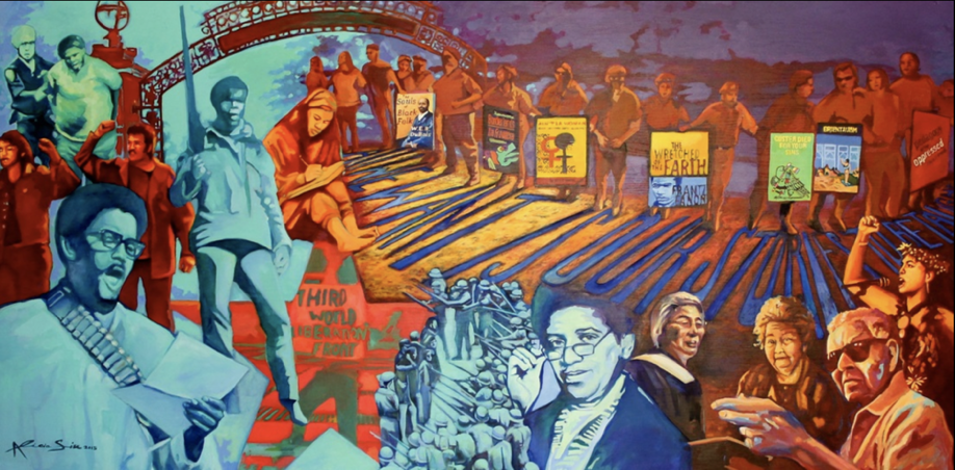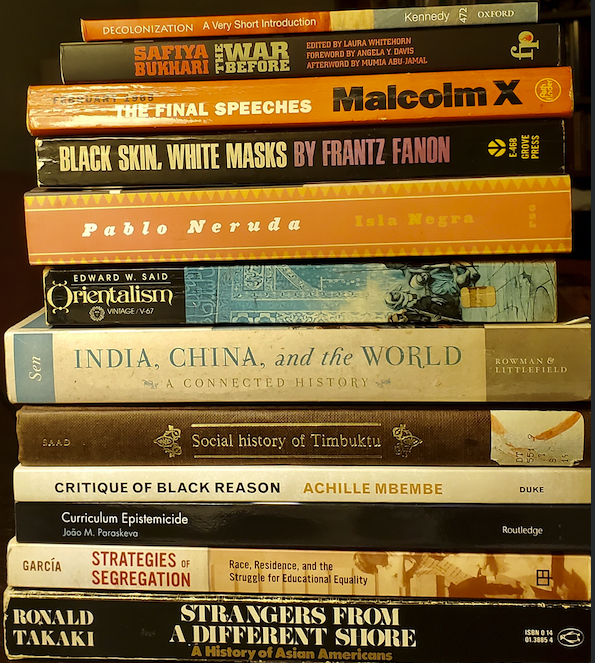LBST Courses

LBST 101: CLASS Matters
Units: 2
This course provides first-year CLASS majors and prospective CLASS majors with an introduction to the University in a safe, relaxed atmosphere and promotes a peer community where students can teach, learn, and support each other within and beyond the classroom.
Possible Instructional Methods: Hybrid.
Grading: ABC/NC grading only.
Course Typically Offered: Fall & Spring
Student Learning Outcomes - Upon successful completion of this course students will be able to:
- Identify their personal strengths and assets;
- Describe CSUEB institutional learning outcomes, with particular emphasis on social justice, sustainability, and diversity;
- Explain how our breadth and major requirements relate to CSUEB institutional learning outcomes;
- Locate key information in the university catalog, including grading policies, major roadmaps, and breadth requirements;
- Participate in the CSUEB community culture by investigating campus resources and facilities that enhance well-being (academic, social, physical, emotional); and
- Develop an academic plan and self-enroll in Spring Semester Courses.
LBST 201: Introduction to Liberal Studies
Units: 3
Introduction to the liberal arts educational approach, and application of interdisciplinary perspective to selected contemporary issues. Emphasis on information, reasoning, and evidence in written and/or visual presentations.
Possible Instructional Methods: Entirely Online, On Ground or Hybrid.
Grading: A-F grading only.
Course Typically Offered: Fall & Spring
Fall 2024
LBST 201 - Intro to Liberal Studies (3 Units) Ellis-Marino E.
01 LEC 50/50 T Hayward Campus MI-2106 7:00P-9:00P
** Meets in person on Aug. 29, Oct. 17, and Nov. 14, 2024
WEB-ASYNCH
Spring 2025
LBST 201 - Intro to Liberal Studies (3 Units) Ellis-Marino E.
01 2777 1 LEC 35/35 Online Campus WEB-ASYNCH
** Meets online on Jan. 22, Feb. 26, and Apr. 9, 2025 7:00P-9:00P
Student Learning Outcomes
- show preliminary appreciation of the concept and importance of a well-rounded liberal arts education;
- show emerging foundational knowledge and understanding of interdisciplinary perspectives (humanities, social sciences, and natural sciences) on one or two contemporary issues of global scale;
- present the issue in question from interdisciplinary perspectives with reasonable articulation of the issue, past attempts to address the issue, and remaining problems, with reasonable evidence and valid reasoning;
- present the above in both speech and writing, supplemented by relevant visual and quantitative information; and
- engage in team work on a course project within a small group

LBST 223: Education for Liberation
Units: 3This lower division, interdisciplinary course focuses on how teachers and students can help create a more fair and just society. The class focuses on institutional challenges, educational policies, social problems and solutions in and through K-12 education as it relates to the intersections of race, class, gender, sexual orientation, and ability. The class provides students an opportunity to learn critical theories and practices that lead to liberatory forms of education. Crosslisted as ES 223. This course meets the CSU Ethnic Studies (Area F) requirement.
Prerequisites: Currently offered for students in the INSPIRE Program. Available to all majors beginning Spring 2025.
Credit Restrictions: none.
Possible Instructional Methods: Entirely Online, On Ground or Hybrid.
Grading: A-F grading only.
Course Typically Offered: Fall & Spring
Student Learning Outcomes
- analyze educational policies and practices;
- articulate theories of social change in education;
- apply praxis models to address educational issues; and
- discuss the intersection of ethnic studies and education.
Area F Learning Outcomes
- Using a comparative or focused approach, explain and analyze core concepts such as racialization, racism, white supremacy, racial capitalism, critical race theory, intersectionality, women of color feminisms, queer of color theory, (counter)hegemony, eurocentrism, self-determination, food justice in communities of color, environmental justice, liberation, decolonization, genocide, sovereignty, indigeneity, imperialism, settler colonialism, antiBlackness, or anti-racism as analyzed in Native American/American Indian/Indigenous Studies, Chicana/o/x or Latina/o/x Studies, African American/Black/Africana/African Descended/Descendent of Enslaved African Studies, Asian/Pacific Islander/Middle Eastern/South Asian (APIMESA) American Studies.
- Critically analyze the Black feminist concept of intersectionality and the intersection of race, class, and gender with other axes of oppression including sexuality, sexual violence, religion/spirituality, national origin, immigration and citizenship status, ability, Indigenous sovereignty, language, and/or age as they apply to African American/Black/African diasporic/African Descended/Descendant of Enslaved African, Chicana/o/x or Latina/o/x, Asian/Pacific Islander/Middle Eastern/South Asian (APIMESA) American, and/or Native American/American Indian/Indigenous communities.
- Critically review how struggle, resistance, rematriation, social justice activism, solidarity, abolition, and liberation, as experienced, enacted, and studied by American Indians/Native Americans/Indigenous people, African Americans/Black people/African diasporic/African Descended/Descendant of Enslaved Africans, Asian/Pacific Islanders/Middle Eastern/South Asian (APIMESA) Americans and/or Latinas/os/xs or Chicanos/as/xs are relevant to current and structural issues such as communal, national, international, and transnational politics as for example, in health disparities, educational inequities, immigration policies, reparations, settler-colonialism, language policies, media depictions of ethnic/racial groups, racial and sexual violence, prison industrial complex, community development, gentrification, and/or other ethnic politics.
Spring 2025
LBST 223 - Education for Liberation (3 Units) Dela Cruz, G.
01 1 LEC 35/35 Meets in person on Hayward Campus W 4:30-6:30pm CORE 179

LBST 499: Liberal Studies Senior Seminar
Units: 3
Capstone course for Liberal Studies majors in their final year. Take this course in your senior year and not earlier. Emphasis on interdisciplinary analysis of a significant contemporary issue. Written and/or web-based presentation of research and/or community engagement activities, and student learning outcomes portfolio.
Prerequisites: LBST 201.
Possible Instructional Methods: Entirely Online, On Ground or Hybrid.
Grading: A-F grading only.
Course Typically Offered: Fall & Spring
Fall 2024
LBST 499 - Liberal Studies Senior Seminar (3 Units) Ellis-Marino E.
01 LEC 35/35 WEB-ASYNCH
Spring 2025
LBST 499 - Liberal Studies Seminar (3 Units) Desai R.
02 1 LEC 35/35 WEB-ASYNCH
Student Learning Outcomes
- show solid foundational knowledge and understanding of interdisciplinary perspectives (humanities, social sciences, and natural sciences) on one contemporary issue of global scale;
- present the issue in question from interdisciplinary perspectives with clear articulation of the issue, past attempts to address the issue, and remaining problems, with solid evidence and clear reasoning;
- perceive and express personal and societal values and ethical orientations regarding the issue, present the above clearly in both speech and writing, supplemented with relevant visual and quantitative information;
- engage in team work on a course project within a small group, showing ability to listen and adopt comments and suggestions from others; and
- develop a personal portfolio showing accomplishments of the Liberal Studies Program SLOs.